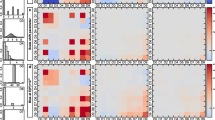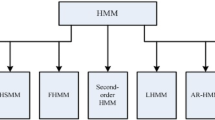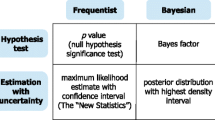Abstract
In this paper the family ofφ-divergence estimators for loglinear models with linear constraints and multinomial sampling is studied. This family is an extension of the maximum likelihood estimator studied by Haber and Brown (1986). A simulation study is presented and some alternative estimators to the maximum likelihood are obtained.
Similar content being viewed by others
References
Ali, S.M. and Silvey, S.D. (1966). A general class of coefficient of divergence of one distribution from another.Journal of the Royal Statistical Society,28, 1, 131–142.
Basu, A. and Basu, S. (1998): Penalized minimum disparity methods for multinomial models.Statistica Sinica,8, 841–860.
Berkson, J. (1980). Minimum chi-square, not maximum likelihood!.Annals of Statistics,8, 457–487.
Bonett, D.G., Bentler, P.M. and Woodward, W.A. (1986): The asymptotic Covariance Matrix of the Likelihood Parameter Estimator in Conditional Poisson Log-linear Models.Biometrical Journal,28, 758–762.
Bonett, D.G. (1989): Pearson Chi-square estimator and test for log-linear models with expected frequencies subject to linear constraints.Statistics & Probability Letters,8, 175–177.
Causey, B.D. (1983). Estimation of proportions for multinomials contingency tables subject to marginal constraints.Communications in Statistics (Theory and Methods),12, 2581–2587.
Christensen, R. (1997):Log-Linear Model and Logistic Regression. Springer-Verlag.
Cressie, N. and Pardo, L. (2000): Minimum φ-divergence estimator and hierarchical testing in loglinear models.Statistica Sinica,10, 867–884.
Cressie, N. and Pardo, L. (2002): Model checking in loglinear models using φ-divergences and MLEs.Journal of Statistical Planning and Inference,103, 437–453.
Cressie, N., Pardo, L. and Pardo, M.C. (2003): Size and power considerations for testing loglinear models using φ-divergence test statistics.Statistica Sinica,13, 550–570.
Cressie, N. and Read, T.R.C. (1984). Multinomial goodness-of-fit tests.Journal of the Royal Statistical Society, Series B,46, 440–464.
Csiszár, I. (1963). Eine Informationstheoretische Ungleichung und ihre Anwendung auf den Bewis der Ergodizität on Markhoffschen Ketten.Publications of the Mathematical Institute of the Hungarian Academy of Sciences,8, 84–108.
Felipe, A. and Pardo, L. (2005): A new family of estimators for the loglinear models of quasi-independence based on power-divergence measures. Submitted.
Fleming, W. (1977):Functions of Several Variables. Springer Verlag, Second Edition.
Haber, M. and Brown, M.B. (1986): Maximum likelihood methods for log-linear models when expected frequencies are subject to linear constraints.Journal of the American Statistical Association,81, 477–482.
Haberman, S.J. (1974):The Analysis of Frequency Data. University of Chicago Press.
Harris, R.R. and Kanji, G.K. (1983). On the use of minimum chi-square estimation.The Statistician,32, 379–394.
Kullback, S. (1985). Kullback information. InEncyclopedia of Statistical Sciences, Volume 4 (editors S. Kotz and N. L. Johnson), 421–425. John Wiley & Sons, New York.
Morales, D., Pardo, L. and Vajda, I. (1995). Asymptotic divergence of estimates of discrete distributions:Journal of Statistical Planning and Inference,48, 347–369.
Pardo, J.A., Pardo, L. and Zografos, K. (2002): Minimum φ-divergence estimators with constraints in multinomial populations.Journal of Statistical Planning and Inference,104, 221–237.
Pardo, L. and Pardo, M.C. (2003): Minimum Power-Divergence Estimator in Three-way Contingency Tables.Journal of Statistical Computation and Simulation,73, 818–831.
Pardo, L. and Menéndez, M.L. (2005): Analysis of divergence in loglinear models when expected frequencies are subject to linear constraints. To appear inMetrika.
Pardo, J.A., Pardo, L. and Pardo, M.C. (2005). Minimum φ-divergence estimator in logistic regression models. To appear inStatistical Papers.
Pardo, L. (2005):Statistical Inference based on Divergence Measures. Chapman & Hall.
Parr, W.C. (1981). Minimum distance estimation: A bibliography.Communications in Statistics (Theory and Methods),10, 1205–1224.
Rao, C.R. (1962). Efficient estimates and optimum inference procedures in large samples.Journal of the Royal Statistical Society, Series B,24, 46–72.
Read, T.R.C. and Cressie, N.A.C. (1988).Goodness of fit for Discrete Multivariate data. Springer-Verlag, New-York.
Silvey, S.D. (1975):Statistical Inference. Chapman & Hall.
Author information
Authors and Affiliations
Additional information
This work was parcially supported by Grant DGES PB2003-892
Rights and permissions
About this article
Cite this article
Martín, N., Pardo, L. Minimum phi-divergence estimators for loglinear models with linear constraints and multinomial sampling. Statistical Papers 49, 15–36 (2008). https://doi.org/10.1007/s00362-006-0370-3
Received:
Revised:
Issue Date:
DOI: https://doi.org/10.1007/s00362-006-0370-3




